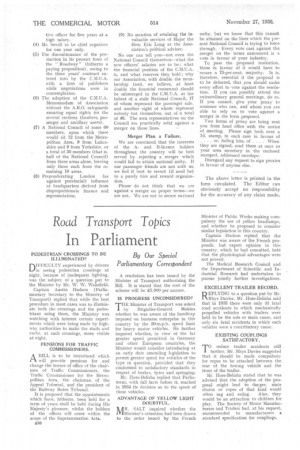Road Transport Topics
Page 40

If you've noticed an error in this article please click here to report it so we can fix it.
In Parliament
PEDESTRIAN CROSSINGS TO BE ILLUMINATED?
DIETICULTY experienced by drivers M seeing pedestrian crossings at night, because of inadequate lighting, was the subject of a question put to the Minister by Mr. W. W. Wakefield.
Captain Austin Hudson (Parliamentary Secretary to the Ministry of Transport) replied that while the best procedure in most cases was to illuminate both the crossings and the pedestrians using them, the Ministry was watching wi.th interest certain experiments which were being made by highway authorities to make the studs and curbs, at such crossings, more visible at night.
PENSIONS FOR TRAFFIC COMMISSIONERS.
A BILL is to be introduced which
will provide pensions for and change the tenure of office of the chairmen of Traffic Commissioners, the Traffic Commissioner for the Metropolitan Area, the chairman of the Appeal Tribunal, and the president of the Railway Rates Tribunal.
It is proposed that the appointments which have, hitherto, been held for a term of years shall be held during His Majesty's pleasure, whilst the holders of the offices will come within the scope of the Superannuation Acts.
B30 A resolution has been issued by the' Minister of Transport authorizing the Bill. It is stated that the cost of the scheme will be £3,000 per annum.
IS PROGRESS UNCONSIDERED? 'TIIE Minister of Transport was asked
i by Brigadier-General Makins whether he was aware of the handicap imposed on business enterprise in this country by the 20-m.p.h. speed limit for heavy motor vehicles. He further inquired whether, in view of the far greater speed permitted in Germany and other European countries, the Minister would consider introducing at an early date amending legislation to permit greater speed for vehicles of the type in question, provided that they conformed to satisfactory standards in respect of brakes, tyres and springing.
Mr. Hare-Belisha replied that Parliament, with full facts before it, reached in 1934 its decision as to the speed of these vehicles.
ADVANTAGE OF YELLOW LIGHT DOUBTFUL.
MR. SALT inquired whether the Ministers attention had been drawn to the order issued by the French
Minister of Public Works making compulsory the use of yellow headlamps. and whether he proposed to consider similar legislation in this country.
Captain Hudson replied that the Minister was aware of the French proposals, but expert opinion in this . country, which he had consulted, held that the physiological advantages were not proved.
The Medical Research Council and the Department of Scientific and Industrial Research had undertaken to pursue jointly further investigations.
EXCELLENT TRAILER RECORD.
REPLYING to a question put by Mr. Rhys Davies, Mr. Hore-Belisha said that in 1935 there were only 81 fatal road accidents in which mechanically propelled vehicles with trailers were held to be the sole or main cause, and only six fatal accidents in which such vehicles were a contributory cause.
EXISTING COUPLINGS SATISFACTORY.
reduce trailer accidents still further, Mr. Rhys Davies suggested that it should be made compulsory for ropes to be attached between the rear of the towing vehicle and the front of the trailer.
Mr. Hare-Belisha stated that he was advised that the adoption of the proposal might lead to danger, since chains or ropes of that kind would
often sag and swAng. Also, they would be an attraction to children for play. The Society of Motor Manufacturers and Traders had, at his request, recommended to manufacturers a standard specification for conplings.




















































































